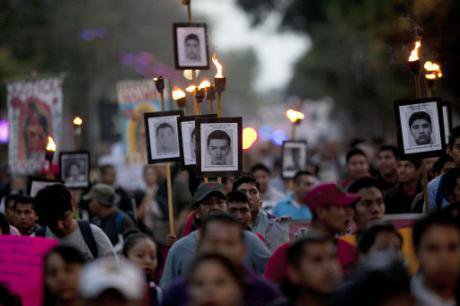
Relatives of the 43 missing students from the rural teachers’ college march holding pictures of their missing loved ones during a protest in Mexico City. Dec. 26, 2015. AP Photo/Marco Ugarte. All rights reserved
Professor Sergio Aguayo, from the Colegio de México and Harvard University, is one of the greatest Mexican thinkers alive and a referent for many people. He explains how, "from sheer helplessness", Mexicans try to cope with these times of defencelessness, of collusion between organized crime and the law enforcement and political instances which, instead of guaranteeing the security of citizens, fluctuate between complicity, brazen connivance and indifference to the suffering of the victims. Aguayo participated recently in an international seminar organized by the University of Leiden, in the Netherlands, under the title of "From disorder to order: conflict and legitimacy resources in contexts of conflict, expansive violence or other forms of disorder."
José Zepeda: Tlatelolco and Ayotzinapa: an analyst or researcher could conclude, without appearing to be ignorant, that these are two different moments, with different motivations: 68 as a transforming aspiration, Ayotzinapa as youth rebellion. And yet, you assert that there is a deep and inescapable continuity between the two. What is the link?
Sergio Aguayo: The raison d’être of a State is to guarantee the security of the population, and this is why it has the legitimate monopoly of the use of force. From this premise, Tlatelolco and Ayotzinapa represent two expressions of the same phenomenon: the loss by the Mexican government of its control over force. On the night of Tlatelolco it was an all-powerful, omnipotent state, and yet it lost control over state violence. This triggered the transformation of Mexico. I maintain that, from that moment on, the Mexican State began to see how the control of force slipped through its fingers, and was then captured by organized crime and other political and state instances. In the end, the problem is the same: a state that does not control violence is also unable to protect its citizens.
JZ: Does Tlatelolco mark a before and after in the history of Mexico?
SA: The watersheds of history are always symbolic moments: the storming of the Winter Palace and the Bastille exemplify much more complex processes. In the case of Tlatelolco, it is a traumatic moment because it involves the killing of peaceful civilians before the international press - the reporting in the national media was scant. The journalists informed the world that the country that was organizing the Summer Olympics had been the author of a massacre – and this was a brutal blow to the regime. The thesis at first was that the material author of this massacre was the army, but it actually was a more complicated operation, set up by the President of the Republic, who sent a group of officers from the Presidential General Staff to control a defenseless population.
In the end, the problem is the same: a state that does not control violence is also unable to protect its citizens.
JZ: In your recent book State violence from Tlatelolco to Ayotzinapa you say that one day you took the option for the peaceful way, although you admit that "on more than one occasion I was tempted by the armed struggle"...
SA: My generation, which is the postwar generation, came of age in the sixties and in those days the temptation of violence was very strong. The music, the aesthetics, the pronouncements, Cuba, Vietnam, they were all inviting those of us who were against injustice to emulate the revolutionary gestures of Castro and Che Guevara. Like many of my contemporaries, I hesitated between the peaceful way and the armed struggle.
In my particular case, the movement of '68 was decisive in that it put me on the peaceful track ever since. It made me understand violence so as to contain it. This is what I have done all my life: to contain the primary impulses, to tame unreason with thought, with rationality. This is the reason why I have devoted myself to studying the multiple expressions of violence and the building of peace.
JZ: I was asking for a special reason. I personally think that these small, radicalized groups, which are a minority within the student movement, unwittingly end up contributing to the implosion and the final ending of the movements. It happened in one way or another in 1968, it happened again, more recently and clearly, with the movement 132: these movements lost popular support due to the bad habits of a few.
SA: Indeed. But radicalism of any sign is part of the human experience. I would agree that these groups, at some point, can be harmful to the course of history, although I am not so sure. I do not want to fall into relativism, but wishing to make history is not the same as interpreting it. In my case, I am more involved with the interpretation side of things, even if from time to time I get into trouble. So, one comes to realize that the role of these radicalized groups from the left and from the right, which for some reason are fundamentalist, must be unraveled. The assessment of their impact may be negative. It usually is, but not always. The Mexican guerrilla activity of the 1970s resulted in a huge sacrifice in human lives, from which an electoral reform was born and a human rights movement that eventually overthrew the regime. What the armed groups were not able to achieve due to their lack of military capacity, their sacrifice succeeded in generating the forces that eventually eroded the regime. I could give other examples of this kind. This is part of the enigma of history. If history could be isolated in a laboratory, we would be talking of another type of science. We humans are not predictable.
JZ: Please forgive my ignorance, but it hurts to learn that Cuba and the former Soviet Union, which were supposed to be the student movement’s allies, had in fact a completely different agenda and were supporting Gustavo Díaz Ordaz's government.
SA: To me it was a terrible disappointment. I had become politically conscious thanks to an American woman poet who, in the sixties, introduced me to the writings of Fidel Castro and Che - in the United States! So, rightly or wrongly, my vision of Cuba, in some way close to reality, had to do with undoubted scientific and educational advances. But when I got deeper into the matter and was later able to confirm it after meeting Fidel Castro, I realized that what was important to them was the friendship of the authoritarian government of Gustavo Díaz Ordaz and Carlos Salinas, because they themselves were, and are, authoritarian. It was only natural that this was the case - the mistake was mine and my generation. Of course, when you say something like this, you get a negative reaction.
This is the story. In 1988 Fidel Castro legitimized Carlos Salinas de Gortari's electoral fraud. He attended his inauguration, on December 1st. I covered the event for the daily La Jornada and was invited to a dinner with the Commander. I went with the President of the Human Rights Academy, the famous anthropologist Rodolfo Stavenhagen. I was impressed, because the invitation said that a small group would have the opportunity to talk with the Commander. But there were hundreds of us piling up in concentric circles to hear the romantic stories of the Cuban revolution - real stories, by the way. When I arrived, someone told me: "here is the queue for the picture with the Commander". I naively refused saying: "I came to talk with him, not to take pictures". And, as we were leaving, Stavenhagen approached Fidel and said: "Commander, what do you have to say about political prisoners in Cuba?". Fidel turned around with hate in his eyes and said: "There are no political prisoners in Cuba." I realized that we were on different planes and that we were never going to agree on the issue of human rights. This got me included in a black minilist of ...
JZ: ... undesirable Mexicans.
SA: Confused Mexicans, let us say.
JZ: It would seem that the aim of the strategy which was planned and put into action by President Díaz Ordaz in Tlatelolco was to radically stop the student protests - with some people killed -, but that its actual execution caused such a chaos that what had been planned as an indiscriminate but selective murder ended up in a massacre.
SA: They had already done it elsewhere, for instance in Chilpancingo, in 1960 (17 to 19 people, no official figure yet, were killed in the city center by Mexican Army troops, on December 30). The scheme was the same: shooting from the rooftops, resulting in some people dead, which then provided a justification for arresting the leadership. In Tlatelolco they lost control of the situation, for reasons that I have never known or been able to find out. The first victim was General José Hernández Toledo, who led the paratroopers' battalion: he was allegedly wounded, the command lines were lost, and this led to a chaos where they started shooting each other. Some students were also shot. It was an operation that went wrong in every way.
In Tlatelolco they lost control of the situation, for reasons that I have never known or been able to find out
JZ: The government's explanation, which was assumed by its supporters and the great majority of the international community, was that well-intentioned, rebellious students had been an easy prey to foreign agents and international communism - the usual enemies of Mexico. But even the CIA said that there was no foreign involvement in the movement of 68.
SA: Whenever an opposition movement arises, whoever is in power always tries to disqualify it, to delegitimize it. It does so in many ways. In those years, it was very popular to invoke the CIA in order to discredit an individual or a collective political actor. When you access the documents, however, you realize the intentional use of the accusations - and it is up to whoever writes the story to place each one in his due place.
I have always tried to let the evidence chose the adjectives. Of course, I do have my own opinion and, when I write, I do so with an idea and a hypothesis in mind. The difficulty is to let the adjectives speak. In this sense, evidence shows that there was no CIA invovement. There were no foreign actors. Funnily, Cuba, the Soviet Union, China and the United States all agreed to support the regime, not the students. The day someone demonstrates with facts that the students, on October 2, wanted to take over Tlatelolco and declare an alternative government, that day I will include it in History. The advantage we have as academics is that we live in the age of reason - where reason is the legitimator. We are the legitimators of the public actor, which gives us both an enormous power and also a great weakness: we do not influence day-to-day events, but we do determine who sticks to rationality.
Tlatelolco was an act of irrationality - not only in its development, but also in its ethical justification. Because there is another legitimacy, which was also present in the French revolution: human rights, the respect for human dignity. And the moment when the pillars of the legitimacy of the Western world are violated, the violators are condemning no one but themselves - not the chronicler who records their irrationality.
Tlatelolco was an act of irrationality - not only in its development, but also in its ethical justification.
JZ: You have come to the conclusion that the State was responsible for the Tlatelolco massacre, for laying a deadly trap for both the students and the members of the armed forces, and for turning the students, under the Doctrine of National Security, into the internal enemy. Do you think this conception is still alive?
SA: It is. It is still there, but they are BEING less successful each time they try to use it. In 1968, Mexico was an isolated country, closed to the world. In the 21st century, we are an open nation. Legitimacy no longer depends on internal actors only, it is being built by a number of global actors who give their opinion. Take any phenomenon you like: it is no longer enough for a president to make this or that statement about it. "Climate change does not exist", for example, is an opinion that is refuted by evidence put forward by scientists from all over the world, by governments, by international organizations. We are living in a more complex world, which is also more democratic in terms of legitimacy building. Today, success depends on internal strength and the economic and political forces at play, but choosing your adjectives from the beginning is pretty ineffective. What is effective is the legitimacy that is built on the basis of the double dialectic between reason and ethics – this is what does prevail some times. Even though irrationality prevails some other times, I believe our current context is such that well-knit and solid reasoning can hardly be knocked over.
JZ: You have recently coordinated an important investigation into some sadly famous massacres in Mexico. Its title is catchy, but terrible: From helplessness – which refers to the fact that those who are supposed to protect us, and be on our side, are not; and so, we are left helpless.
SA: The importance of this investigation is that we had legal access to the official reports, as part of an agreement between my institution, the Colegio de México, and a state agency. In it we give documentary evidence, without a shadow of doubt, that neither the State protects us against criminals, nor does it care for us as victims. We are helpless.
The title of the investigation synthesizes the terrible situation that the Mexican population finds itself in - a situation which is similar to that of the citizens of Central American countries.
The study focuses on two tragedies: the massacre of 72 migrants in Tamaulipas, in San Fernando, in August 2010; and the disappearance of 42 people in Allende, Coahuila, in March 2011.
JZ: It was in the news recently: a group of people who were looking for their missing relatives found 4.600 bone fragments in what could be the largest mass grave in Mexico's history.
SA: I do follow the case of Patrocinio in La Laguna, Cohahuila, and I dare say that this finding is not the end of the story. To the extent that the State was absent and left much of the territory to organized crime, the population there was exposed to the savagery of groups interested only in making money and exercising their power over life and death.
We do not know how many people these remains belong to, but knowing what has and is happening in other states, I can anticipate that there are still a number of clandestine graves to be opened, which will help us to establish what these years of barbarism have actually been. The Mexican state declared war on organized crime without a clear strategy to fight it, and without a clear strategy to protect the victims. We were left alone.
JZ: And you have decided not to remain silent…
SA: I would not feel at ease with myself if I were to shut up, having the evidence. If I think of all the anonymous victims I have met, or the remains I have seen in clandestine graves, or the mother who has been looking for her daughter for many years, I feel that I have an ethical obligation towards them, towards the victims, not to remain silent.
The Mexican state declared war on organized crime without a clear strategy to fight it, and without a clear strategy to protect the victims.
I am not a hero and I do not want to be a martyr. I am a privileged person because I got an education, I was awarded scholarships, I have been trained to manage information. The thought of those who have no voice obliges me to proceed carefully and responsibly. In these times of ethical relativism and ideological confusion, of absence of any great project, I believe in the certainty that only reason and ethics can give. The French Revolution remains the foundation of our world, and we must make the best of it.
JZ: Being pessimistic, one could say: considering that Mexico has no solution, things can only get worse. But let us end on a positive note, for there is always a future beyond the times of infamy. What do you think are the minimum measures to be taken in order to move forward?
SA: A renewal of the ruling class, the people in government, and a greater involvement of society in the defense of its rights. It is an elementary recipe: to the extent that society is organized, the ruling class is forced to react.
We are living, actually, in very difficult times. However, there is a multiplicity of concrete citizen actions which are continually renewing the civic, political, and cultural actors. My generation, that of the postwar period, that of '68, is accountable for both good and bad things: we have freedom of expression, and political consciousness, but we have failed in other aspects.
I see myself, at this stage, as having the responsibility to help generational change. In my activities, in my work teams, I see to it that young people predominate. They are the generation that will take up the causes and refine them. From that perspective, I feel that I do what I must. Not enough? Well, maybe. But it has been a long time since I did away with the fantasy that my responsibility was to save a class, much less a country.
Read more
Get our weekly email
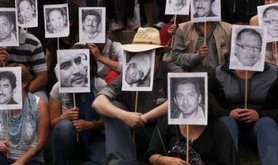
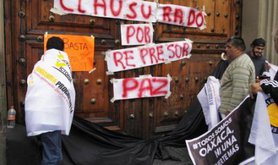
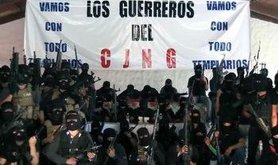
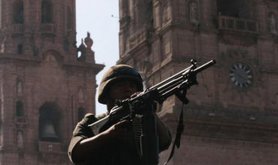
Comments
We encourage anyone to comment, please consult the oD commenting guidelines if you have any questions.